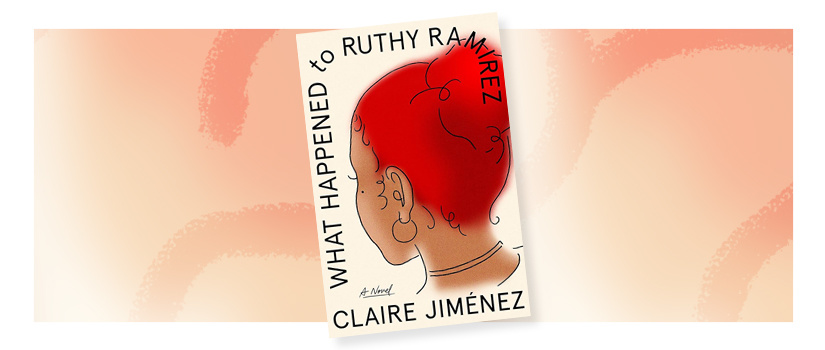For Claire Jiménez, the newest PEN/Faulkner Award winner, voice is everything. During her reading this past spring at USC’s Open Book literary series, the novelist spoke about her dedication to capturing her characters’ voices, to evoking the musicality of each sentence. What Happened to Ruthy Ramirez, her award-winning debut novel, is a testament to her mastery of this literary technique.
Speaking about herself, though, is a different story. “I get a little nervous,” the assistant professor of English began at Open Book, testing the mic. “So if you hear me cough, it’s not COVID, it’s...anxiety.”
You know who is eager to speak about Claire Jiménez? Her students. Within minutes of receiving an invitation to reflect on their experience in a South Carolina Honors College section of “Creative Writing, Voice and Community,” several of Jiménez’s students were eager to contribute.
The course, taught this past spring, consisted of 16 students—none of whom was an English or creative writing major. “I love teaching introductory fiction workshops and hearing the stories of my students,” says Jiménez. “It inspires me and reminds me why I began writing.”
In her students’ words
Guided by Jiménez’s encouragement and ability to create a supportive classroom environment, the workshop course was an invitation to a different style of learning. “This class intrigued me because I had never taken a course that allowed me to be creative throughout my time at USC,” says Sarah Peter, a rising senior business student.
Sandra Garcia Fierros, a rising junior pharmacy major, noticed an immediate connection to her instructor: “One of the things that caught my eye was her last name of Latin American origin, and I thought taking her [class] would make it a more relatable experience for me,” she says.
For a group new to the craft of creative writing, Jiménez took great care to cultivate a collaborative classroom community. “Dr. Jiménez does not pressure students to partake in discussions,” says Garcia Fierros. “Rather, she takes a couple students who are more open to talking and creates a classroom where people desire to partake. Seeing everyone else talking encourages even the most shy to join the discussion.”
Trust the process
The first half of the semester included close readings of literary texts and conversations about craft. “I feel as though I’ve been able to recognize a lot of the techniques we've studied in this class—such as how to write effective dialogue, how to frame a scene or how to add rhythm to sentence structure—in much of the fiction I’ve read since,” says Bryson Stakely, a rising senior music major. “I feel this has made me able to appreciate writers I enjoy on an even deeper level than I have previously.”
Writing workshops filled the latter half of the course. Each day, students brought their stories to class, and peers offered feedback. For those used to lecture- or lab-based instruction, this was a daunting undertaking.
“It was a nerve-wracking, yet exciting experience,” recalls Briana Feland, a rising junior studying exercise science. “I was so excited to share my hard work with the class, yet I was also nervous that no one would like it. However, it was such a great experience, and the feedback from my classmates has encouraged me to venture into writing more.”
This positive experience was no accident: Jiménez took great care to establish a supportive atmosphere, and the effort was not lost on her students. “I feel that a large emphasis of the course was finding ways to develop your own voice as a writer,” Stakely reflects. “Likewise, I believe that Dr. Jiménez's emphasis on highlighting the positive aspects of a story really helped to draw this out.”
“One day, a few weeks into this class, I said that I was never a writer,” Peter recalls. “In response, Dr. J. encouraged us as a class to embrace the idea that we could become stronger writers and to not reject the title of ‘a writer.’ This stuck with me throughout the course and made me feel more confident as I went through the rest of the semester.”
Works in progress
Though the class has concluded, Jiménez’s students will carry her lessons into their personal and professional lives. Ali Mullendore, a rising junior psychology major, noticed a change in her approach to writing: “In college we are so used to only turning in our best work—that final draft we had spent hours perfecting. But Dr. Jiménez encouraged us to be content with the imperfect and find joy in the process of writing, not solely the finished product.”
Feland mentioned that the class helped her rekindle a childhood love of writing, and her classmate Garcia Fierros concurred. “Despite not having much experience with creative writing, this has really opened my mind to an idea of journaling and simply reading more fiction,” says Garcia Fierros. “As a STEM major, sometimes it’s easy to drift away from fictional literature, but this course really brings one back.”
Peter also noticed a beyond-the-classroom correlation: “While there aren’t many direct links between storytelling and the finance industry,” says Peter, “making meaningful connections with others is crucial for success in the business world.”
The last word
No matter what careers Jiménez’s students pursue, they will be united by the creative writing experience they shared in the spring of 2024. Jiménez encouraged them to develop their voices, to trust their classmates, and to discover the unifying power that stories hold.
“After taking this class my eyes have opened as to how necessary it is to preserve the craft of telling a really good story,” Mullendore reflects. “Our whole world is made of stories: our families, our experiences, our struggles and our triumphs. A classmate of mine put it best when he said that in this new age of AI and technology, a good story puts humanity back into the world.”
